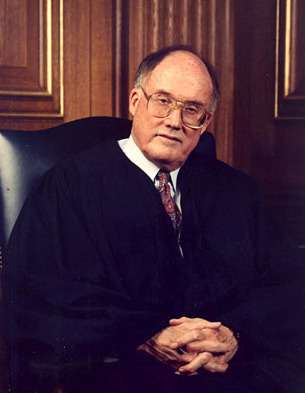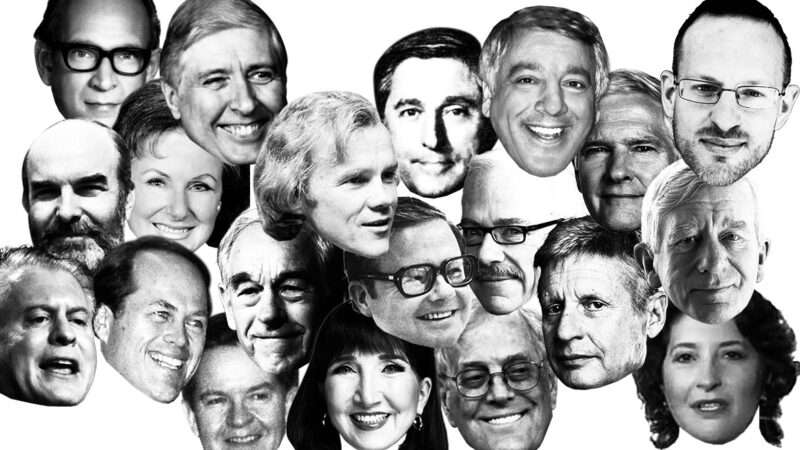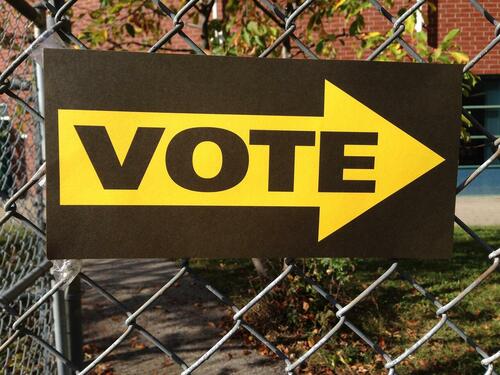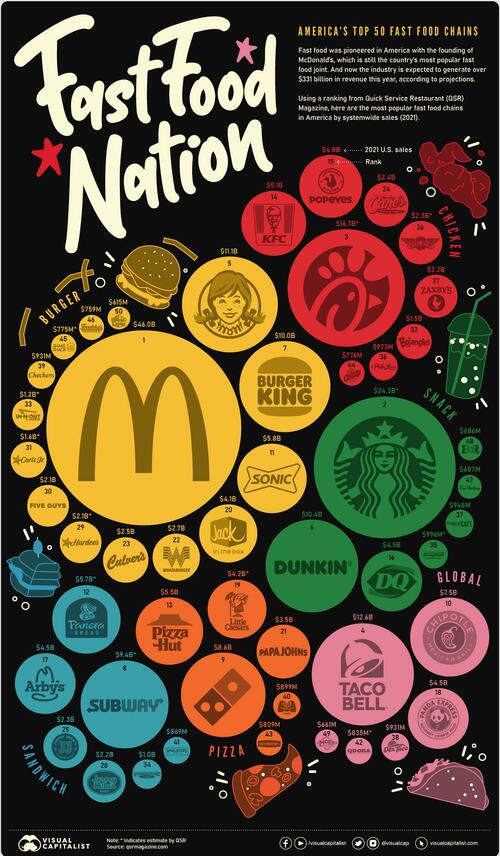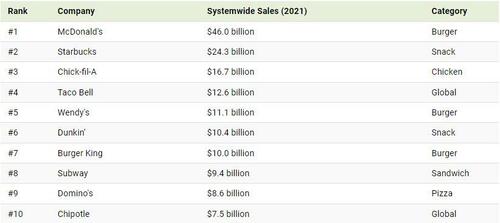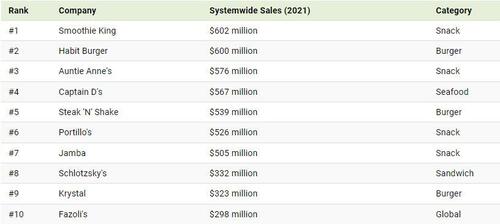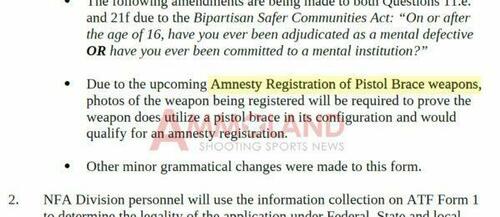Senior Editor Brian Doherty, author of the 2007 book Radicals for Capitalism: A Freewheeling History of the Modern American Libertarian Movement, has interviewed dozens of people across the years about their role in creating and operating what has been over the past decade America’s third most successful political party. Quotations have been edited and condensed for style and coherence. The interviews that comprise this oral history were conducted in 2022 unless otherwise noted.
When an internal caucus led a self-styled “takeover” of the Libertarian Party (L.P.) at its biennial national convention this past May, old-timers recognized a recurring conflict that has riven the party since its first national convention a half-century ago.
“The best analogy within the party history is 1983, when [Earl] Ravenal did not get the [presidential] nomination, and all the Cato people walked out,” says Chuck Moulton, former vice chair of the Libertarian National Committee (LNC). “We see repeatedly with different caucuses, whether it be the Radical Caucus or the Pragmatic Caucus or whatever, they will gain attention, and then they’ll leave, and then they’ll come back. There’s an ebb and flow.”
From its founding in 1971 to its shock win of a rogue Electoral College vote in 1972 to on-again/off-again involvement of such significant American political figures as David Koch and Ron Paul to its current streak of three consecutive third-place presidential finishes, the party’s goals have whipsawed strategically between making an impact in elections and simply winning converts, between making libertarianism go down smoother and making sparks with the movement’s roughest edges.
With its presidential vote totals in the last three elections nearly double the total of every prior one put together, the L.P. after 50 years can’t be counted out as a significant player in shaping the future of American political ideas, even if not elected officials.
1971–74: ‘Come to Beautiful John Galt Country!’
David Nolan (1943–2010), inventor of the Nolan Chart which scores quiz-takers on a grid based on their belief in economic and civil liberties, co-founded the Libertarian Party in 1971. He spoke with Reason in 2005.
David Nolan: It became obvious that despite some lip service, the Republicans were not the party of free markets or pro–individual liberty in any consistent sense. Nixon, this culture of lying and spying, was the antithesis of what this scattered band of less than a thousand liberty-minded young people had hoped. The average age of the people who formed the L.P. was around 28.
A bunch of us in Denver happened to meet on August 15, 1971, when Nixon on TV announced wage and price controls and taking us completely off the gold standard. So we started getting people to sign up and officially declared our existence on December 11, 1971. A first newsletter was sent out asking for strategy and tactics. We got a majority saying, “Yes, let’s run someone for president.”
Ed Crane, who co-founded the Cato Institute in 1977 and served as its president until 2012, was LNC chair from 1974 to 1977. He spoke with Reason in 1998.
Ed Crane: I was a money manager for Scudder Stevens & Clark, dressed conservatively as I do today, and I went to the hotel for the founding convention. As a libertarian I always knew it was important to be tolerant of alternative lifestyles, but until I walked into that convention hall I had no idea how many alternatives there were.
Nolan: Sunday, June 18, 1972, began the first national convention. We named [John] Hospers as the first L.P. presidential candidate, and his running mate was Tonie Nathan. We were inventing a new thing, with 89 delegates from 23 states. The lengthiest debates occurred over Vietnam and free trade vs. national security, whether government can outlaw trade with enemy nations. Our solution was to say nothing on these two points, leaving candidates and local organizations to take their own stand.
D. Frank Robinson served on the first LNC board and co-founded the Oklahoma Libertarian Party.
D. Frank Robinson: No one else had any credentials that approached [those of Hospers], who was on the faculty of the [University of Southern California] philosophy department. He’d written a book on libertarianism—who’s going to run against you on that?
Tonie Nathan (1923–2014) was the party’s 1972 nominee for vice president. She spoke with Reason in 2005.
Tonie Nathan: The way I got to the first L.P. convention was I saw an ad in Reason magazine: “Come to beautiful John Galt country!” That told me there were Randian ideas there; I considered myself an Objectivist. I got my degree in journalism and thought I’d go to Denver and take my camera and interview people for a daily local NBC show in Eugene [Oregon]. That’s what I had in mind. I was surprised there wasn’t more media there.
I thought [that an early draft of the statement of principles] was ridiculous, making conflicting statements, and I said, “You can’t have a statement of principles that has no principles,” and sat down. Nolan said, “Now, why can’t everyone get to the point the way Tonie Nathan did?” The next day Bill Susel, one of Hospers’ friends, approached me about being vice president. Of the party? “No, no, of the United States.” I was surprised. I called my son, who had introduced me to Objectivism, and he and my husband thought it was a great idea. So I said yes.
Nolan: We were heavily Objectivist. In an early survey, three-quarters [of party members] considered themselves lowercase-o objectivists—can’t use the big O without Rand’s seal of approval—or at least objectivist-influenced; the other quarter were limited-government constitutional conservatives or anarchists, with the anarchist faction vehemently opposed to Vietnam.
The first L.P. convention adopted a membership pledge in which anyone signing up to join the party certified that they “do not believe in or advocate the initiation of force as a means of achieving political or social goals.” It has been in place ever since.
Robinson: David [Nolan] was cognizant of the idea that we need to reinforce our nonaggression principles by saying we don’t advocate violence. Within the parameters of constitutional politics, we were nonviolent.
Out of the 90 people sitting within the convention floor, we assumed there were at least one or two FBI informants.
Crane: One of the things that encouraged me—it sounds ridiculous in hindsight—is we got 980 write-in votes for Hospers. The idea that there were 980 people willing to write in the name of a Libertarian for president was very encouraging. We were on the ballot only in Washington and Colorado.
Nathan: I was watching the news when I get a phone call—it’s a man saying his name is Roger MacBride, and he says, “I wanted you to know I’m going to vote for you for vice president.” I didn’t understand, because the election was over. It dawned on me slowly he was a state elector telling me he was going to cast a vote for Hospers. “I think Nixon has lost his way; I can’t vote for him.”
He wanted to know [if] he had my name right. I told him Theodora was my real legal name, but I never used it. I heard that at the announcement [of Virginia’s electoral votes, someone said] there was one vote for “Theodore Nathan,” and someone corrected: “Theodora.” And [the person announcing] turned around: “What? A woman?”
1975–79: ‘We Were Thinking We Were Going To Change the World’
David Boaz, longtime executive vice president of the Cato Institute and now a senior fellow there, co-managed Ed Clark’s 1978 California gubernatorial campaign.
David Boaz: [The 1975 Libertarian Party convention] was at a hotel across the street from Penn Station. A few hundred people were there. When I walked in, a couple of people were having a screaming fight in the middle of the lobby. So that was my introduction to libertarians. It was probably the first time I was in a place where I heard there was a meeting of gay delegates, gay libertarians.
Robinson: Everybody was very grateful that [Roger MacBride had] bucked the system to cast his electoral vote, and the guy didn’t say anything to antagonize anybody. There was no reason for him not to be the nominee.
David Bergland (1935–2019) was the vice presidential nominee in 1976, the presidential nominee in 1984, and a two-time chair of the LNC. He spoke with Reason in 1998.
David Bergland: When it came time for the vice presidential nomination, Roger wanted [then–Reason editor] Manny Klausner, who would have been excellent. But this was a bunch of Libertarians who had power under the rules to elect who they wanted, and they wouldn’t just let Roger point at who he wanted. The nominating process got locked up.
[On] Saturday, [anti-tax activists] Karl Bray and Hank Hohenstein called me [in California] and said if you fly out here you can probably get nominated. I called the airlines and there was enough time to get a red-eye out to New York, and I was nominated along with lots of others, and won it on the first ballot [that I was part of], and I became the 1976 vice presidential candidate.
MacBride was wealthy himself; he bought a damn DC-3 and had it outfitted to fly around as his campaign plane. Crane named it No Force One, and Roger flew himself around the country. About the only time he ever hit news was when one of the plane’s engines started to smoke and we had to fly back: “L.P. candidate plane in trouble!”
MacBride/Bergland received only 0.21 percent of the popular vote, but an anti-tax, anti-inflation mood was rising across the country, and with it Libertarian ambitions.
Crane: I rolled up my sleeves and convinced [Los Angeles–based lawyer] Ed Clark to run for governor of California [in 1978]. And he got 377,000 votes, 5.6 percent, over 10 percent in some counties, with a very minimal campaign, [though] he was on the radio all the time. That breathed life into the party.
Boaz: I went to California to co-manage the Clark for Governor campaign. Tom Palmer and I were grabbed and sent to Southern California to circulate [ballot-access] petitions and also manage a team of models [who were] always looking for day work. So six to eight attractive young women were circulating petitions for Clark.
Perhaps the high point of the campaign was when we got a phone call telling us that the Bakersfield, California, newspaper was going to endorse Clark. That made the top-of-the-hour radio news when it came out, like: Significant newspaper had endorsed a third party candidate!
Clark was on the ballot as an independent because that was easier to meet signature requirements, but our campaign materials always said Libertarian.
Bob Costello, who in 1994 would found Americans for Limited Terms, was co-chair of the Clark for Governor campaign.
Bob Costello: Cato was across the street [in San Francisco]; they had a really nice office. We were in the warehouse with Libertarian Review magazine and the Students for a Libertarian Society. I got to California the evening Prop. 13 passed. We were thinking we were going to change the world, that we’d elect a Libertarian president in the next eight years.
When Dan White killed the mayor and Harvey Milk, then he got off on the Twinkie defense, there were riots, and some libertarians participated in the riots and burning of cars and stuff. We had a picnic in Golden Gate Park one time, all our libertarian crew, and guys in skinny ties were on the hill taking photos of us. I had a college friend I drove to the airport to pick up, and somebody tailed me all the way to the airport and back to the office. My friend got out of the car and went back to [tell them], “I got nothing to do with this guy’s politics, we’re just friends, don’t add me to a list!”
Dick Randolph, who served two terms as a Republican in the Alaska House of Representatives from 1970 to 1974, became the first elected Libertarian state legislator in 1978, serving another two terms.
Dick Randolph: There were a couple of hippie-type kids at the state fair doing the [Nolan Chart quiz]. They said, “Get over here and take the test.” So my first introduction to the L.P. were these two hippies.
My next contact was [a friend who knew] Roger MacBride, who was coming to Fairbanks as the Libertarian candidate for president. I said, “I don’t want to meet a hippie running for president.” She talked me into coming. And here’s Roger, three-piece suit, button-down guy. Made lots of sense.
I was the only real politician [MacBride] had seen at a Libertarian function. He talked me into running his campaign in Alaska. I knew a lot of good people in the state, took six months of my life running his campaign, and got 6 percent statewide and 12 percent in Fairbanks, where I lived.
Roger did well enough that two years later, I’m thinking maybe there’s something to this. So I decided to run for the legislature again and got a team of three other guys, all from Fairbanks, credible people, good reputations and good businesses, to run with me. We ran as a Libertarian team. All our signs said, “If you really want change, here we are,” you know? Unfortunately I was the only one elected—barely. [As a Libertarian] you have to defend prostitution, gambling, all the sins. That’s a tough way to run a campaign.
I had way more fun the second time as a representative. I was a minority of one, made lots of noise, got lots of press. I was very much a populist. Not only did I get reelected but I recruited a good friend [Ken Fanning]. Popular, a fish-and-game guy; he ran an operation called the [Great Denali-McKinley Trespass]. Mount McKinley Park was being run in a dictatorial way by the federal government, and a lot of people were pissed. Ken had several thousand people just go into the park and do whatever they wanted to do, cut down trees, kill birds. You’re thinking that’s not a popular thing to do, but it made Ken pretty famous statewide.
I was the top vote-getter the second time instead of the last [among those elected], and Ken was second. We did an initiative to repeal the state income tax. It was going to be on the ballot, and the Republican governor, Jay Hammond, hated it, and called a special session to keep it off the ballot. But in the special session, in three days, we totally repealed the state income tax.
At the signing of the bill that ended the income tax, there was a big picture [taken] and I wasn’t invited! My role in the process didn’t get recognized at all. But I feel much better about my four years as a Libertarian than my four years as a Republican.
1980–86: ‘Our Biggest Single Schism’
David Koch (1940–2019), along with his brother Charles, was one of the biggest donors and institution builders in the libertarian movement. (He was a trustee of Reason Foundation, which publishes Reason, for 36 years.) Decades before drawing the ire of the left for GOP fundraising, Koch in 1980 ran for vice president on the Libertarian Party ticket. He spoke with Reason in 2005.
David Koch: Ed Crane and Charles thought I should be recruited to be the vice presidential candidate, because campaign finance law permitted candidates to spend as much of their own money as they could afford on their own campaign. I spent several hundred thousand helping finance the campaign, paying for national TV spots. I did it voluntarily, and it was the fundamental reason why we did so well, got a million votes. I spent a third of my time campaigning over 14 months, visited 27 states.
I’d fly into some city and never knew who was going to greet me—a bunch of bearded long-haired crazies smoking pot or sophisticated businesspeople, and everything in between. One thing we accomplished is that in the 1970s the word libertarian connoted an extreme point of view. I think the campaign we waged with Ed Clark was superb, very responsible, defensible, and I think we legitimized the libertarian philo-sophy and made it a credible point of view.
Boaz: The Clark campaign was organized around getting ideas across in a way that is not outside the bounds of what was politically plausible. When John Anderson got in [the 1980 presidential race as an independent], we recognized he was going to provide a more prominent third-party choice, maybe taking away our socially liberal, fiscally conservative, well-educated vote, and he ended up getting 6 percent. We just barely got 1 percent. And although we said, “This is unprecedented, blah blah,” in fact we were very disappointed.
After the Clark/Koch showing of 1.06 percent, popular Orlando talk radio host Gene Burns began seeking the Libertarian Party presidential nomination in 1983.
Bergland: Gene Burns had a very overstated perception of what the party was and what kind of support we could give him for a presidential campaign. The Clark campaign had given everyone an overblown view of what was possible if you didn’t have Koch money to do it. Gene kept going around the country making appearances [at Libertarian events], and there really wasn’t any opposition. Then about a week before the convention he announced he wasn’t going to do it and dropped out of sight. So now what the hell are we gonna do? I talked to my wife, said I’ll offer myself.
Koch: In the ’83 convention we supported a candidate who was more along the lines of Ed Clark, really a good guy, Earl Ravenal. Great credibility, a man with legit credentials. The opponent of Earl was a much more radical libertarian who was going, “I think taxation is theft, and support of the military should be voluntary”—all these hardcore ideas we thought would discredit the libertarian movement and would be the death knell of the party, so extreme [that] the people who had voted for us in ’80 would be extremely turned off.
And that’s what happened. The vote totals collapsed, and the party was taken over by the extreme wing, and so I have not supported the party since.
Nolan: The problem was Ravenal had no track record as a libertarian. Some good credentials, sounds like a nice enough guy, but who is he? We didn’t know him, didn’t trust him. That he was a member of the Council on Foreign Relations did not sit well.
The lure of alleged credibility with national media and another infusion of Koch money swayed a lot of people, and it was a close race. [But then] the Koch-Crane-Cato faction, despite swearing they were in for the long haul, literally got up and walked out of the convention hall [after Ravenal failed to win the nomination]. A fifth of the delegates walked out—our biggest single schism.
Bergland: My nomination was a surprise, so we didn’t really have any campaign organization at the time of the convention. And as we tried to get set up, all the Koch money was gone and the Crane people [were] all busy at Cato and not gonna bother with my campaign. I could spend time most productively and build for the future by trying to do as good a job as possible in getting journalists clear on who we were and what we stood for. We’d get the standard “You don’t have a chance to win, so why are you running?” and I’d say, “[Democratic candidate Walter] Mondale doesn’t have a chance to win, why don’t you ask him that question?”
1987–94: ‘The Paul Campaign Was a Departure’
After Bergland’s 0.25 percent showing in 1984, the party at its 1987 nominating convention saw a stark choice between the former GOP congressman Ron Paul and the radical American Indian Movement activist Russell Means, who had faced federal charges for his role in a 1973 occupation at Wounded Knee that resulted in two deaths. Paul won, narrowly, and was the presidential candidate in 1988. He spoke with Reason in 2005.
Ron Paul: If you just put it down on paper and put Russell Means here and me here, and what I’ve done, you’d think you shouldn’t even have to campaign. You’d think I’d get a little more credibility. It was much tougher than it should have been. If we hadn’t worked at it, we’d have lost the thing, which would have been pretty embarrassing.
Mary Gingell was LNC chair from 1991 to 1993, after serving two prior terms as vice chair.
Mary Gingell: I was somewhat sympathetic to Russell Means, and feeling that Ron Paul had a bit of a conservative bent. That wasn’t comfortable to me.
I came from the conservative world. I was part of Young Republicans and Young Americans for Freedom; I actually worked in their national office during college, and I was glad to get away from that. So anything that smacks of conservatism makes me a little nervous. I probably was a Means supporter on the first ballot. He was much more of a heroic figure in a sense. Since then, I’ve come to appreciate Ron Paul a lot more. But I think at the time, Russell Means seemed more like the hero.
Bergland: The Paul campaign was a departure to the extent [that] you can think of us as having a long enough history to have a departure from. Paul was a Republican who came to the party, and his core support group had not been active with the party. We took this guy who was in essence an outsider.
An argument in favor was [that] he came from the hard-money investment area, so he’d bring lots of people in with fat checkbooks, and that would be good. Also, he was prominent enough to run enough of a campaign to get new members, and that would be good too. But neither of those two things happened.
Paul: When I ran [for Congress] in 1974, essentially nobody knew what I was doing, and even when I won in 1976 for a total of three and a half terms, there were very few who understood. In the 1970s, libertarianism was just coming alive, and I’d have liberal Democrats more often recognize that there was something different and strange [about me] compared to conservative Republicans. But by the time I went back [to the GOP after running for president as a Libertarian], there was a lot of difference. Part of my motivation was to see if I could make our ideals palatable in the Republican Party, which was a bigger challenge.
Paul received 0.47 percent of the vote in 1988, the party’s second-best showing to that point, but in 1992 he chose to back Republican presidential challenger Pat Buchanan. In 1996 he returned to Congress as a Republican, serving until 2012 and running for the GOP presidential nomination twice. Paul’s running mate, Andre Marrou, who had served from 1985 to 1987 in the Alaska legislature as a Libertarian, had an easy time securing the 1992 nomination. But things quickly soured from there.
Gingell: The National Committee got this big packet of materials from [Marrou’s former chief of staff] Michael Emerling, talking about how Marrou was basically a bad guy, that he didn’t pay child support and he didn’t handle his finances well, and blah blah blah, and we should remove him as the presidential candidate. Meanwhile, the national party is frantically pedaling to get ballot access, and we were going to have to deal with this. So basically, whatever our agenda has been, who knows? It got hijacked, and we spent seven hours going through this report, item by item, with Marrou.
The only thing we can take him out for is for conducting his campaign not in accordance with the platform. That’s what the bylaws say. That’s what we can use to remove a presidential candidate. Otherwise, the will of the delegates is sacred. The National Committee is supposed to support that candidate. So this is what we did.
Steve Dasbach was LNC chair from 1993 to 1998 and campaign manager for presidential candidate Jo Jorgensen in 2020.
Steve Dasbach: They did not remove him from the ticket. It was clear that the material had come from staff on the campaign, and some of the staff members were terminated. And so three people from the National Committee were tapped to essentially run the remainder of the presidential campaign. We had to try to figure out how to run a presidential campaign on the fly as three volunteers.
1995–09: ‘Harry’s Campaign Was Killer’
After the Marrou tumult, the party twice nominated the genial investment adviser and bestselling author Harry Browne, who generated two fifth-place finishes.
Bergland: Harry Browne produced all kinds of people with big checks, not just for his campaign but for the party, all done in a way to build the party. Harry’s campaign was killer. It was great. In his field of investment commentary he was tremendously revered. There were people who’d say, “Harry Browne’s name is on it? How much money do you want?”
Dasbach: What I focused on [as national chair] was building a consensus that included both the radical side and the pragmatic side, with membership growth as the key indicator. If you increase membership growth, everything else will come along with it. If you’ve got more members, you’re going to be able to raise more money, you’re going to be able to hire the staff you need, and you can get more media. More candidates will be able to organize more counties, and you’ll get better functioning organizations.
From the time that I was elected we went from 10,000 members to 30,000 [by the end of 1998]. At the end of my second term, we went from, I think, $850,000 raised in ’93 to $2.5 million the year I stepped down as chair. Then in the middle of my term as executive director, we got our maximums in terms of membership and fundraising. We had 33,000 members [at the end of 2000], raised $3.3 million. I think in 2002 we were just over 300 people in elected office.
Author and software engineer Michael Badnarik narrowly beat out Hollywood producer Aaron Russo and radio host Gary Nolan for the 2004 presidential nomination.
Nathan: Badnarik was campaigning in Portland [Oregon] and he wanted a ride—I didn’t know he didn’t drive. He asked if I’d take him to a copy shop. While waiting to get copies, we talked, and when he gets going he’s one of the most eloquent men. That’s what got him the nomination: In the debate he was right on the issues, but more than that he was inspiring in the way he discussed them. I was torn between the notoriety—wrong word, fame of Russo, well-known in Hollywood, agent for Bette Midler. But a Libertarian audience wants to know that if their candidate is being quoted in media that he knows how to put the ideas in the right way. It’s hard for Libertarians to know the difference between truth and principle and not saying anything that alienates a lot of people. They tend to alienate many.
Dasbach: We finally got far enough past 9/11 to send a mailing out, and then the anthrax hit. And that was our post office that got hit! Which basically shut down all of our mail. We used email fundraising to try to cover the gap. People were hesitant about anything to do with mail because of anthrax. You know, they get a letter from D.C.? “Oh, I don’t know about this.” It crushed our returns.
After four consecutive elections with candidates not widely known as politicians, the Libertarian Party once again rallied behind a former GOP congressman who’d only lately changed his spots: Bob Barr. His running mate was a fast-talking Las Vegas media personality named Wayne Allyn Root. But a lot of the political energy around libertarian ideas in 2008 centered on Ron Paul’s first run for the GOP nomination that year. He spoke with Reason in 2008.
Bob Barr: The way I look at it, it isn’t as if Ron Paul built this foundation over here and our campaign built this one over here, and they’re discrete components. We’re building one foundation. What Ron Paul did was a tremendous benefit to the libertarian movement in making people aware of the movement, of our philosophy, of elements people don’t usually hear about in a coherent way.
2010–20: ‘We Got 32 Requests One Morning for National Media After the Weld News’
In the next two cycles, the party’s presidential nominee was the former Republican governor of New Mexico, Gary Johnson. He brought the party unprecedented levels of publicity, fundraising, and votes, as did his running mates, Judge Jim Gray (in 2012) and former Massachusetts Gov. Bill Weld (in 2016). Along with that attention came internal discontent over how radically libertarian the party should be. He spoke with Reason in 2016.
Gary Johnson: I think if you start talking about end goals that are completely unachievable…how about a goal that is achievable but gets you closer to the end result? It’s pragmatic.
My prediction is there are going to be all sorts of former Republican elected officials who would love to shed all that social dogma, and the Libertarian Party is going to find itself in a position of: Holy cow, we got some real choices here!
Bill Weld, since the announcement [of being the vice-presidential candidate], has gotten more press than any declared Libertarian candidate in the history of the Libertarian Party. At the end of the day I am a Libertarian, and that infers loose screws. [Weld] brings a Good Housekeeping Seal of Approval. We got 32 requests one morning for national media after the Weld news.
Bill Weld was a two-term Republican governor of Massachusetts before running for vice president as a Libertarian in 2016, then seeking the Republican presidential nomination in 2020. He spoke with Reason in 2016.
Bill Weld: [Libertarians who mistrust my bona fides] don’t know that in my first day in office in Massachusetts, I started my first press conference saying, “Fellow libertarians.” They don’t know in law school my favorite author was Friedrich Hayek. When I went as a fairly new governor to the [1992 GOP] convention that nominated George H.W. Bush, all the governors got to make a short speech, and mine began: “I want government out of your pocketbook and out of your bedroom.” I’m an economic conservative and socially tolerant and inclusive.
Rep. Justin Amash of Michigan left the GOP in 2019, joined the L.P. in April 2020, announced his intent to seek the presidential nomination, and withdrew from the race three weeks later. Jo Jorgensen, a little-known university lecturer who had run on the 1996 ticket with Harry Browne, narrowly secured the nomination.
Jo Jorgensen: I got more votes, both percentage-wise and more numbers, than Gary Johnson got in his first campaign. It shows that people now are looking for an alternative, and they do like our message. The fact that me—no name, you know, I’ve never held office, I’m basically a schoolteacher—I’m out there spreading these ideas, and people jumped on board, and I got more votes than the two-term governor. I think that that shows maybe we don’t need to have a politician who’s held office. But also it shows that people are finally fed up with the old system and they are finally seriously looking for new alternatives.
There are many people who think you need to pass a purity test in order to be in the party. You know, “We don’t want you unless you agree with us on everything.” I’m going to want to let anybody in who will pay their dues who are for the cause. I can’t imagine somebody who’s a fascist wanting to join the movement. I was at the Florida state [L.P.] convention, sitting at the banquet, and I said, “I think we should let in people who are 70 [percent libertarian] because once you start talking to each other and you see the validity of having people make their own decisions instead of the government, then they get won over.” And somebody sitting at the table said, “It’s funny you said, that because I joined the party as a 70. I did move to 100 and I became an LNC member for two terms.” So I want to bring in people who are interested in liberty, even if they’re not 100.
Dasbach: Despite Bill Weld’s flaws as a Libertarian standard-bearer, he was very effective at bringing in money. And he was very effective at calling his media contacts and getting them both on major media. So when people complained [that the Jorgensen campaign] didn’t do as well as Gary Johnson’s? Well, yeah, we didn’t have Bill Weld raising $10 million from his donors. That what you want? Most guys who are complaining, that’s not what they wanted.
[The Jorgensen campaign raised nearly $3 million] from 40,000 donors. And of those 40,000, 30,000 weren’t in the database; they were new people that heard about the campaign, liked what they heard, and donated. Jo did, in my estimation, extraordinarily well for a candidate who did not have any particular reason for the nation to be aware of her. And this was the second-highest vote total in our party’s history, the only higher one being Johnson [on his second run]. And we got the lowest cost per vote of any campaign in the party’s history.
2021–Present: ‘We Really Ought To Have a Party That Pushes Libertarianism’
Starting in 2017, the Mises Caucus, seeing itself as a place within the L.P. for disciples of Ron Paul, began challenging what it saw as milquetoast messaging from candidates and party leadership. The critique became acute over what Mises members viewed as the national party’s failure to speak out sufficiently against COVID-19 lockdowns and mandates and over alleged “woke” messaging, such as Jorgensen tweeting that “we must be actively anti-racist.” At the 2022 Nevada party convention, the caucus completed what it had been billing as “The Takeover.”
Chuck Moulton is a former vice chair of the LNC and former state chair of the Pennsylvania and Virginia Libertarian Parties.
Chuck Moulton: I’ve been saying for decades [that] the Libertarian Party is ripe for takeover, in that we are a fairly small party. If you want to win the presidential nomination, how do you get the most [L.P. national convention] delegates? The way to do that is to go state by state, make sure your people are the ones elected delegates. So if you figure out who your people are and you get them organized, it’s really easy to take over the delegation. To the extent that you can subsidize that, you can get more of your people there relative to your opposition. [The Mises Caucus] went state by state, and they got a bunch of delegates, and they just out-organized everyone else. They were well-organized because they cared and they put in the time and the money.
Gingell: I consider the end of my term [as national chair] to be the beginning of this gradualist movement, which if you listen to a lot of the talk from the Mises Caucus they were railing against. It took years, but finally someone said “no more” to just this gradualist, watered-down stuff.
From what I saw them do in Nevada, they strengthened the platform with one exception, abortion. I was sitting next to [a Mises Caucus delegate], and he explained to me the reason they wanted to kill [the abortion plank] is because they have a theory that there are all these Republicans who are really libertarians except on the abortion issue, and that that scares them off. They improved the platform otherwise. That’s why I came away with a positive feeling.
Dasbach: There is this notion—it is not unique to the Mises Caucus; it’s been around for a long time. Michael Cloud had an [1978] article about “The Late, Great Libertarian Macho Flash,” which meant presenting issues in the most provocative way that’s guaranteed to get a reaction. This is how you attract attention, right? But it ends up pushing people away.
A good example is, how are you going to legalize cocaine? Now, we actually think that no drug should be illegal. That includes cocaine. But if you purposely go out and lead with an example like cocaine, you are trying to be provocative in a way that’s going to shut people off, as opposed to talking about the idea that we shouldn’t be putting people in prison for choosing to use drugs.
It’s not a case of being pragmatic vs. radical. It’s being intentionally obnoxious. “Well, that’s how you get attention.” Yeah, you can get attention that way, but it’s usually negative. You get this great increase of Twitter engagement, but 99 percent of the interactions are negative, basically people attacking their positions. This is not accomplishing our objectives.
Bergland: If the party didn’t exist, people would look around and say, “We really ought to have a party that pushes libertarianism.” If this particular structure were to get in big trouble, someone would say, “Can’t let that happen. Let’s rebuild it.”
The post The Libertarian Party's Internal Strife Is as Old as the Party Itself appeared first on Reason.com.
from Latest https://ift.tt/BTirQN8
via IFTTT

